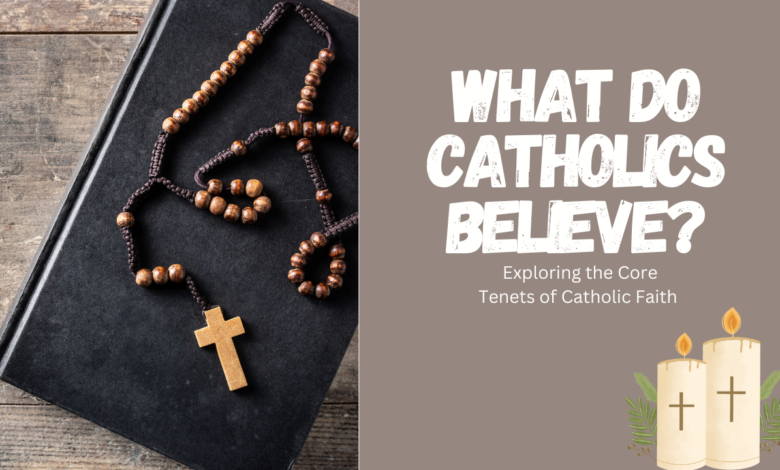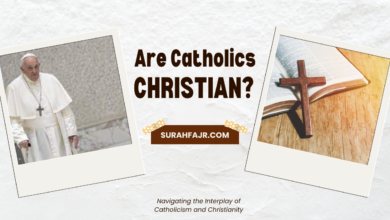
What Do Catholics Believe?
Catholicism is a Christian religious tradition that follows the teachings of Jesus Christ and the authority of the Pope, centered on the belief in the Holy Trinity (Father, Son, and Holy Spirit).

Introduction
Catholicism is one of the oldest and most widely practiced religions in the world, with over a billion adherents. Rooted in the teachings of Jesus Christ, Catholicism has a rich tradition of faith and doctrine that shapes the beliefs and practices of its followers. In this article, we will explore the core beliefs of Catholics, providing an overview of their faith and values.
The Holy Trinity
At the heart of Catholic belief is the doctrine of the Holy Trinity. Catholics believe in one God who exists in three persons: the Father, the Son (Jesus Christ), and the Holy Spirit. This concept reflects the idea of a loving and relational God, and it is a foundational element of Christian faith.
The Incarnation
Catholics believe in the Incarnation, the belief that Jesus Christ is both fully divine and fully human. This doctrine emphasizes that Jesus is the Son of God who became a human being to redeem humanity from sin. The Incarnation is a central aspect of Catholic theology, highlighting the divine nature of Christ’s mission on Earth.
Salvation and Grace
Catholics believe that salvation is a gift from God, and it is achieved through faith, works, and God’s grace. Good works and the sacraments are seen as instruments through which God’s grace is conveyed to individuals, helping them grow in holiness and attain salvation.
Also Check
- Is Christian Bale British?
- Are Catholics Christian?
- Is Drake a Christian?
- The Role of Faith in Christian Belief
- What does Christianity and Islam share in common?
The Bible and Tradition
Catholics hold the Bible as a sacred text, but they also place great importance on tradition. The Bible and sacred tradition complement each other, providing the foundation for Catholic beliefs and practices. The Church, guided by the Holy Spirit, interprets the Scriptures and preserves the teachings of the apostles.
The Seven Sacraments
Catholicism emphasizes the importance of the seven sacraments, which are sacred rituals that convey God’s grace. These sacraments are:
- Baptism: Initiation into the Christian faith.
- Eucharist: Communion, where the bread and wine become the body and blood of Christ.
- Confirmation: Strengthening of faith through the Holy Spirit.
- Reconciliation (Confession): The forgiveness of sins.
- Matrimony: The sacrament of marriage.
- Holy Orders: The ordination of priests and deacons.
- Anointing of the Sick: A sacrament for the ill or dying.
The Communion of Saints
Catholics believe in the communion of saints, which includes not only the living but also those who have died and are with God in heaven. They believe in the intercession of saints, seeking their prayers and guidance in times of need.
The Pope and the Magisterium
The Pope, as the Bishop of Rome and the spiritual leader of the Catholic Church, is considered the successor of Saint Peter. The Pope, along with the college of bishops, forms the Magisterium, which is responsible for interpreting and preserving the teachings of the Church.
Social Justice
Catholicism places a strong emphasis on social justice. Catholics are called to work for the common good, help the poor and vulnerable, and promote peace and justice in the world. This commitment to social justice is rooted in the Church’s teachings and the Gospel.
Conclusion
Catholicism is a rich and complex faith with a deep history and tradition. The beliefs of Catholics are centered around the Holy Trinity, the Incarnation, salvation, the Bible, and tradition. The sacraments, the communion of saints, and the leadership of the Pope and Magisterium are all integral aspects of Catholic theology. Additionally, the Catholic Church’s strong commitment to social justice is a defining feature of its faith. Understanding these core beliefs can provide valuable insight into the spiritual and moral foundation of Catholicism.
(FAQs) about what Catholics believe:
What is Catholicism?
Catholicism is a Christian religious tradition that follows the teachings of Jesus Christ and the authority of the Pope, centered on the belief in the Holy Trinity (Father, Son, and Holy Spirit).
Who is the Pope, and what is his role in Catholicism?
The Pope is the leader of the Catholic Church and is believed to be the successor of Saint Peter. His role is to guide the Church, interpret doctrine, and make decisions on matters of faith and morals.
What is the Holy Trinity?
The Holy Trinity is the belief in one God in three persons: God the Father, God the Son (Jesus Christ), and God the Holy Spirit. Catholics believe in the co-equal and co-eternal nature of these three persons.
What is the significance of the Mass in Catholicism?
The Mass is a central religious service in which Catholics believe that the bread and wine are transformed into the actual body and blood of Jesus Christ through a process called transubstantiation.
What is the role of the sacraments in Catholic faith?
The sacraments are sacred rituals that Catholics believe convey God’s grace and blessings. They include baptism, confirmation, Eucharist (Holy Communion), reconciliation, marriage, holy orders, and anointing of the sick.
What is the role of Mary in Catholicism?
Catholics venerate Mary as the Mother of Jesus and believe in her perpetual virginity, Immaculate Conception, and Assumption into heaven. She is often referred to as the “Mother of God” and is considered a powerful intercessor.
What is the Catholic view on salvation and the afterlife?
Catholics believe in the salvation of souls through faith in Jesus Christ, good works, and the sacraments. They also believe in heaven, hell, and purgatory as destinations for the afterlife.
How do Catholics view the Bible?
Catholics hold the Bible as the inspired word of God, with both the Old and New Testaments. They interpret it through the teachings of the Church and the guidance of tradition.
What is the Catholic stance on social and moral issues?
Catholic social teaching promotes principles of social justice, respect for life, and the dignity of every human being. The Church has specific positions on issues like abortion, contraception, and same-sex marriage.
Can non-Catholics participate in Catholic religious services?
Non-Catholics are generally welcome to attend Mass and other Catholic services, but participation in some sacraments and rituals, like the Eucharist, is typically reserved for baptized Catholics.

